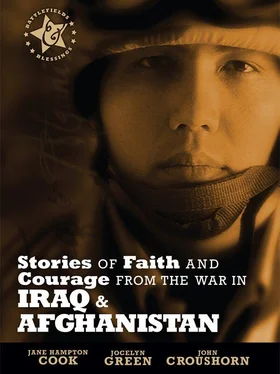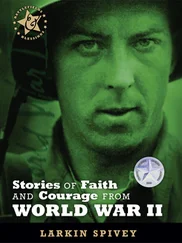January 10
DUST THAT TURNS DAY INTO NIGHT
Corp. Will Brandon, United States Marine Corps
The dust storm wind was so loud that it drowned out the engine of our amphibious assault vehicle. Tracks, as we called them, are armored personnel carriers. I was part of a three-man crew transporting fifteen Marines that night March 24, 2003, just four days into the invasion of Iraq. We were about eighty to one hundred miles north of An Nasiriyah on our push to liberate Baghdad. Despite the wind, Lance Corporal Mejia’s voice came in loud and clear over the intercom in my helmet.
“I can’t see anything out here,” Mejia exclaimed as he drove.
“Just keep close enough to see the track in front of us,” Sgt. Connors instructed from the turret. “Everything alright down there L.B.?”
“Yes, Sergeant, everything’s cool. Real dusty though,” I responded from the troop compartment. I was the rear crewman. My job was to keep an eye on the infantry in the back and provide security for them when they exited the vehicle.
The dust was pouring into our track’s open hatches. We had been through a couple of dust storms, but nothing like this. Visibility was about ten meters, forcing our column of thirty-seven tracks to move at a snail’s pace.
“Listen up,” Connors called. “I just heard over the net that we can’t move any further in this dust. We are going to set up our defense for the night.”
It took several hours to set up our armored coil, a security formation resembling a clock with tracks filling the clock’s positions at 90-degree angles. After trudging through relentless dust, we finally got into position.
When the infantry started digging, the strangest thing happened. The dust got so thick, it turned day into night. This was the darkest pitch I’d ever seen. It was so dark when I got out of the track, I couldn’t see my hand in front of my face, even with my night vision goggles. I had to feel my way along the track to reach the rear personnel hatch.
Then a bizarre thing happened. It got light again. The world around us was wrapped in a strange red fog, as if we were on Mars. The dust wasn’t strongly blowing anymore, but visibility was only about a couple hundred meters. Half an hour later, it was dark again for good. Night had finally come. Because of the dust no one, including the enemy, would be moving tonight, so we thought.
Prayer:
Father, though the wind sometimes howls and dust hinders my visibility, I put my trust in you.
“I am laid low in the dust; preserve my life according to your word.” (Psalm 119:25)
January 11
NIGHT WATCH
Corp. Will Brandon, United States Marine Corps
A couple hours into that night, the dust storm began to let up. As visibility became completely clear, we were shocked to see an enemy convoy about four kilometers to our direct front. Lacking our night vision capability, the enemy used very dim headlights to maneuver. Although these headlights were about half as bright as regular automobile headlights, they were very visible from our position. We were astonished. The Iraqi convoy stretched from one end of the horizon to the other. It was just sitting there, not moving.
All I could think about was what a great opportunity for an air mission. The chatter over the radio suggested it was going to be a target for the artillery. We used the artillery quite often, and the round of choice was Improved Conventional Munitions. The ICM is a big bullet that bursts open and drops a bunch of little bombs that are designed to take out tanks. They could blow a two-foot hole in packed dirt so precisely that you could drop a soda can down the opening.
Finally, after what must have been more than an hour of staring at this massive enemy convoy, we heard the sound of Marine artillery guns way off in the distance to our four o’clock. Five seconds later, we heard the burst, followed by the crackle of hundreds of mini bombs impacting. Unfortunately, all of the shells hit way to the left or right. Nothing hit any of the enemy vehicles to our direct front. The bomb had one effect. The enemy immediately turned off their lights.
“Great,” we all thought. “We didn’t hit any of them and now we can’t even see them.”
As I sat behind the driver’s station where Lance Corporal Mejia watched the thermal driving screen, I switched between binoculars and night vision goggles trying to get a glimpse of something out there. Finally we saw movement. More than a dozen large dust signatures were barely visible in the air. Only one thing could throw a dust plume that high a tank! Our twenty-six ton tracks are no match for a forty or sixty-ton standard battle tank. A .50 caliber machine gun could chew us up, let alone a round from the main gun of a tank.
All we could do was watch and wait for help as we stared into the darkness with a giant enemy in front of us.
Prayer:
Heavenly Father, be my watchman throughout my day and night today.
“Watchman, what is left of the night? Watchman, what is left of the night”? (Isaiah 21:11b)
January 12
CHATTER
Corp. Will Brandon, United States Marine Corps
As we stared into the inky darkness, knowing an Iraqi tank convoy covered the horizon directly to our front, the radio chatter keyed up.
“We needed help out here and fast,” we pleaded.
We had no tanks with us at that moment; they had all gone to refuel a big problem. The only thing we had was several shoulder-fired AT-4s, rockets which are only good out to three hundred meters in the daytime. The Iraqi tanks would make easy targets of our highly silhouetted tracks long before that.
Our platoon sergeant, “the Gunny,” began calling our commander over the comm, the communications network.
“Colgate, this is Iceman,” we heard come across the net. “Why don’t we have any tanks out here?”
“The tanks say they’re not coming until they refuel, Iceman.” Colgate responded.
“What do you mean they aren’t coming till they refuel? We are going to be in some serious trouble here real soon!” Gunny exclaimed. “What about CAT?”
CAT is a Humvee with a TOW missile on top of it.
“CAT can’t make it out to us,” was the response. “Ground is too rough.”
“All right everybody listen up. This is Iceman. Everybody start your vehicles now. We are getting out of here as soon as the first shot is fired.” Everyone immediately started their trucks.
“No one is going anywhere. Shut your vehicles down now,” Colgate shouted over the net; the anger quite apparent in his voice. Just as fast as we started them, we shut the trucks off.
Mejia and I went into the troop compartment and unstrapped the AT-4s. We jumped out of the back of the truck, and called over to an infantry squad leader, a corporal, who had ridden with us.
“What’s going on, what’s up with you guys?” he asked.
“There are fifteen tanks coming this way, you guys need to get these ready,” Mejia said handing him the rockets.
After Mejia and I returned to the Amtrak, the wind picked up. Everything looked hazy as dust filled the air again. This was worrisome because now we couldn’t see the tanks anymore, only the dust. The whole world around us lit up once again into a Mars-like amber glow. It was as if a streetlight suddenly turned on over a dark foggy street.
Chatter is often useless, leading us nowhere. Babbling was no substitute for real action, real decision-making.
Prayer:
Weed out the fruitless noise and chatter in my mind and heart today. Fill it with the substance of you and the promises of your word for righteousness.
Читать дальше












